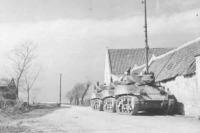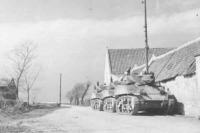I got to know the English very well and I have to say that their behavior during the war was exemplary
Joseph Pochman was born on February 24, 1921, in Chrášťany, near Rakovník. After accomplishing the fourth grade of municipal school he switched to a military music school and then he was assigned to a regiment in Bratislava where he also studied at a college of music. In order to escape conscription to forced labor after the constitution of the Protectorate he and a friend fled from Czechoslovakia. They were caught first in Cluj, Romania, and later in Budapest, Hungary. Joseph was eventually deported to the Slovak frontier but with the help of the French Consulate, he managed to cross the border to Yugoslavia. What followed was a journey through Greece, Turkey, Beirut and Marseille to Agde where the Czechoslovak exterritorial army corps was being formed. He was given a uniform and a military training and went to war. After the collapse of the French defenses and a runaway to Gibraltar, Mr. Pochman managed to escape to Britain. He applied for the Royal Air Force but since he wrote in his documents that he had studied at a college of music, he was assigned to the army band. However, he continuously tried to become engaged in combat operations and also applied for the air-born division. He eventually found action in the battle for Dunkirk. He was a medic in an ambulance and he was wounded by a grenade splinter. After the war, Mr. Pochman left the army and played at concerts together with an orchestra from England. It was here that he met his future wife. They moved to Zlín where he played with the local orchestra.


